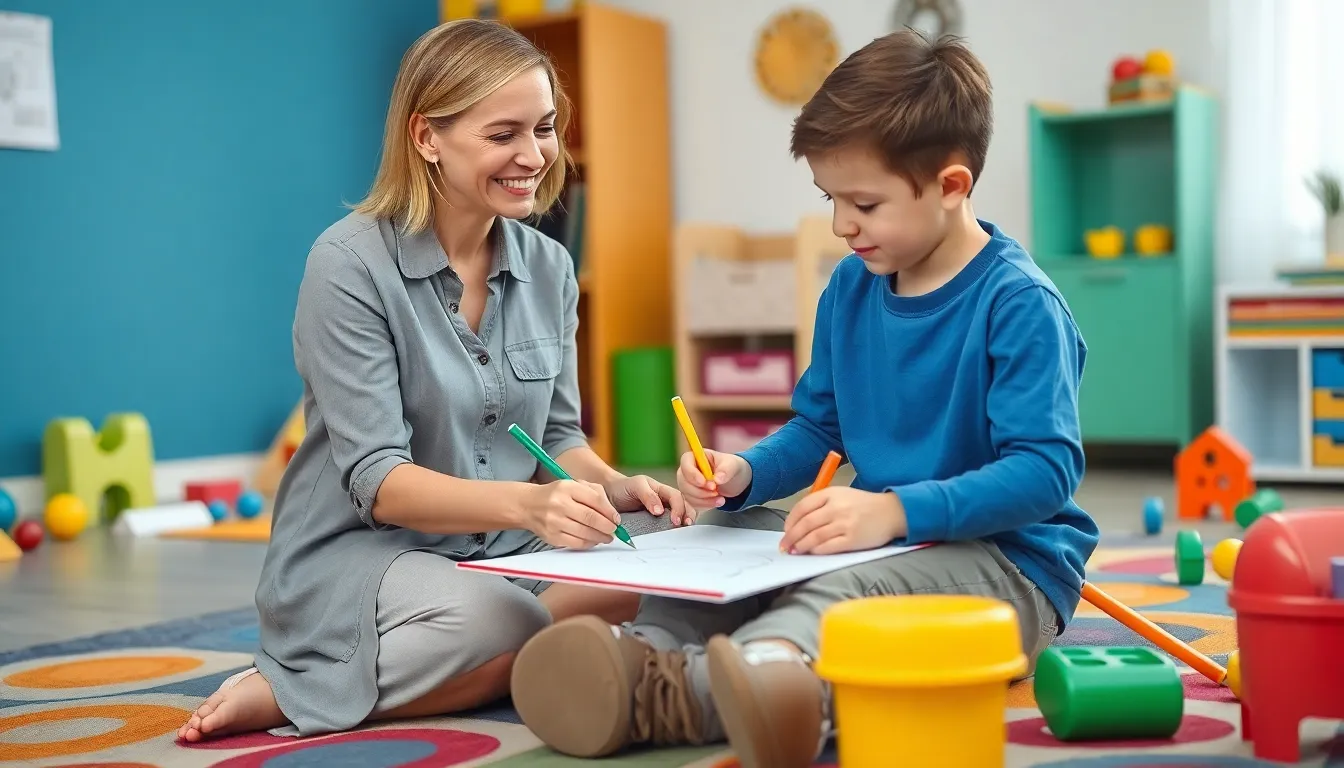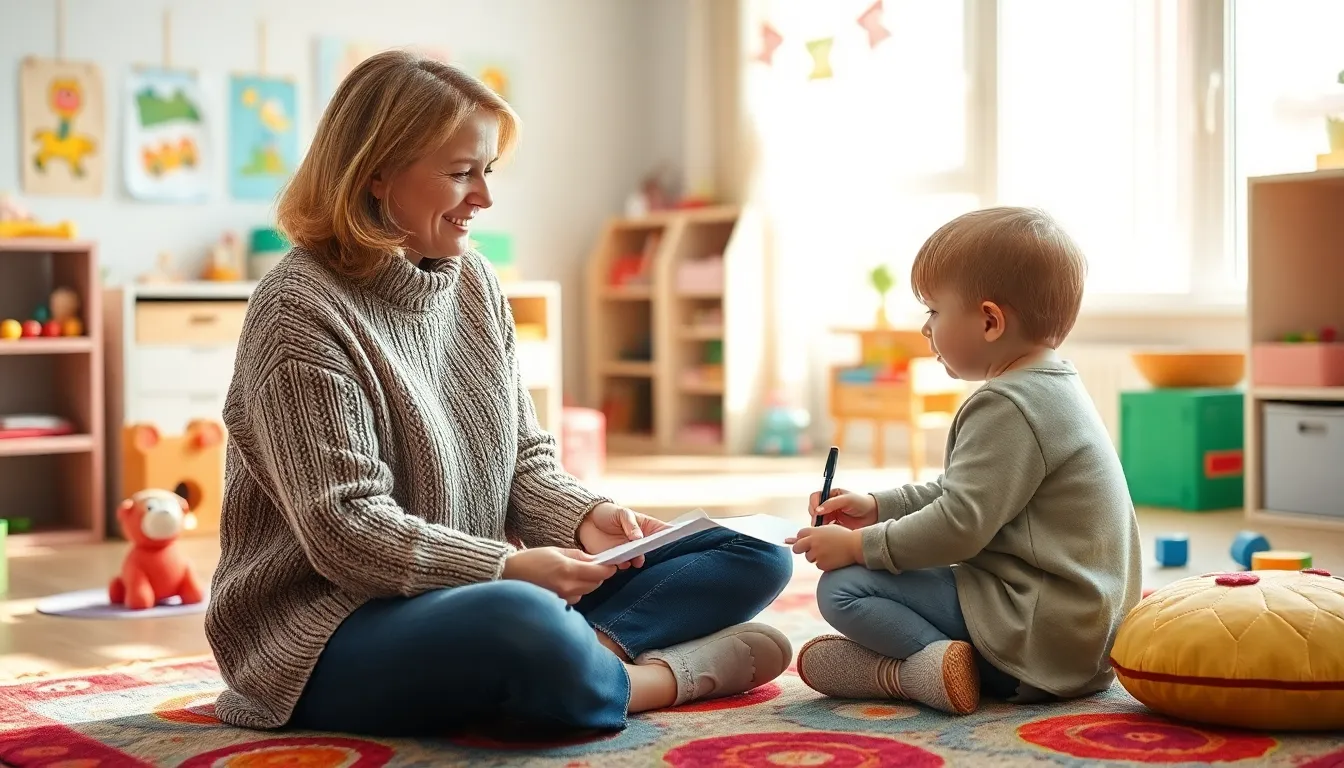Table of Contents
ToggleIn a world where kids face pressures that would make even the toughest adult sweat, the role of a child mental health specialist has never been more crucial. These unsung heroes help little minds navigate the stormy seas of emotions, anxiety, and social challenges. Think of them as the friendly neighborhood superheroes, armed with tools like therapy and empathy instead of capes and superpowers.
With the rise of mental health awareness, parents are realizing that seeking help isn’t just a good idea—it’s essential. Whether it’s helping a child cope with bullying or tackling the stress of school, these specialists provide invaluable support. So, if you’re wondering whether your child could benefit from a little extra TLC in the mental health department, you’re definitely not alone. Let’s dive into the world of child mental health specialists and discover how they can make a difference in young lives.
Understanding Child Mental Health
Child mental health significantly impacts overall well-being and development. Prioritizing mental health fosters emotional resilience and academic success.
Importance of Mental Health in Children
A strong foundation in mental health aids children in developing coping skills. Parents and caregivers recognize the relationship between mental health and academic performance, with studies showing that children with positive mental health achieve better grades. Early intervention plays a critical role, as addressing mental health issues at a young age can reduce long-term problems. Access to mental health support encourages emotional expression, leading to healthier relationships and improved social skills. Engaging with child mental health specialists offers invaluable support during challenging times.
Common Mental Health Issues in Childhood
Anxiety disorders rank among the most prevalent mental health issues in children, affecting approximately 7% of kids aged 3 to 17 years. Attention-deficit/hyperactivity disorder (ADHD) impacts around 9.4% of children, contributing to difficulties in attention, hyperactivity, and impulsivity. Depression also emerges as a concern, with 3.2% of children experiencing symptoms by age 17. Behavioral disorders such as oppositional defiant disorder (ODD) and conduct disorder (CD) notably affect social interactions and academic performance. Understanding these common issues empowers parents and caregivers to seek timely support from child mental health specialists.
Role of a Child Mental Health Specialist

Child mental health specialists play an essential role in supporting children with emotional and psychological challenges. These professionals use various therapeutic techniques to help children navigate difficulties such as anxiety, stress, and social pressures.
Education and Training Requirements
Child mental health specialists typically require a master’s degree in fields like psychology, social work, or counseling. Licensing follows education, with many states requiring an additional clinical experience component. Often, becoming a licensed mental health professional includes passing relevant exams. Continuous education remains important to stay updated on best practices and emerging research in child mental health.
Skills and Qualities of Effective Specialists
Effective specialists must possess strong communication skills to interact both with children and their families. Empathy serves as a critical quality, allowing professionals to connect with young patients on a deeper level. Patience becomes vital, as building trust can take time. Creativity in therapy approaches can engage children more effectively. Additionally, cultural competence remains key, as understanding diverse backgrounds influences treatment.
Treatment Approaches Used by Specialists
Child mental health specialists employ various treatment approaches to address the unique needs of young patients. Effective methods cater to individual issues, such as anxiety or depression.
Therapeutic Techniques
Therapeutic techniques form the core of treatment plans for children. Cognitive-behavioral therapy helps children recognize distorted thoughts and develop coping strategies. Play therapy allows younger children to express feelings through play, fostering emotional healing. Additionally, family therapy encourages open communication and relationship building, facilitating a supportive environment. These approaches enable specialists to tailor interventions based on the child’s specific circumstances while promoting better mental health outcomes.
Medication Management
Medication management may also be necessary for some children facing significant mental health challenges. Psychiatrists evaluate the need for medication and monitor its effectiveness closely. Common medications for conditions like ADHD or anxiety include stimulants, non-stimulants, and antidepressants. Specialists discuss potential benefits and side effects with parents, ensuring informed decisions. Ongoing assessments and adjustments keep treatment optimized, supporting children’s overall well-being and development.
How to Choose the Right Child Mental Health Specialist
Selecting an appropriate child mental health specialist involves several essential steps. Factors influencing the choice impact a child’s well-being and treatment efficacy.
Factors to Consider
Experience with children shapes a specialist’s ability to connect effectively. Areas of expertise should align with the child’s needs, whether dealing with anxiety, ADHD, or behavioral disorders. Credentials cannot be overlooked; verify educational background and state licensing. Consider the specialist’s communication style, ensuring it fosters a comfortable environment for the child. Location also plays a role; proximity facilitates regular appointments. Consultation fees might vary, so understanding costs helps in budgeting for ongoing support. Additionally, involve the child in this process to gauge their comfort level and preferences.
Questions to Ask During Initial Consultation
Asking targeted questions during the initial consultation forms a foundation for understanding the specialist’s approach. Inquire about their experience with specific issues faced by the child. Understanding treatment methodologies helps parents gauge compatibility. It is crucial to ask about the expected duration of therapy and its goals. Discuss how progress will be measured; clarity in this area aids in setting realistic expectations. Exploring how they include parents in the therapy process is vital for ongoing support at home. Finally, ensure to address any concerns regarding confidentiality and the privacy of sensitive information.
Child mental health specialists play a crucial role in nurturing young minds and fostering emotional resilience. Their expertise not only addresses immediate challenges but also lays the groundwork for long-term well-being and academic success. By prioritizing mental health, parents and caregivers can empower their children to navigate life’s complexities with confidence. The journey towards mental wellness begins with understanding the importance of early intervention and seeking the right support. With the right specialist, children can thrive in a supportive environment that promotes healing and growth.





